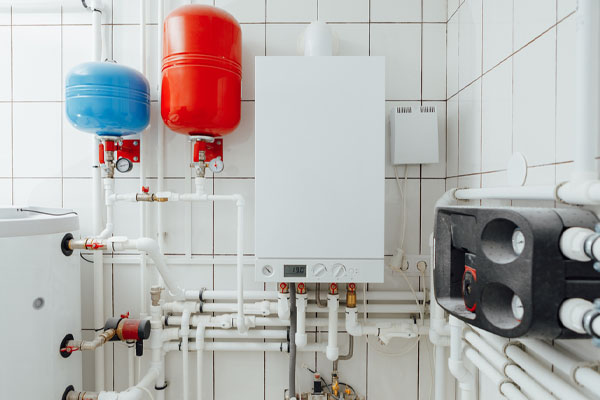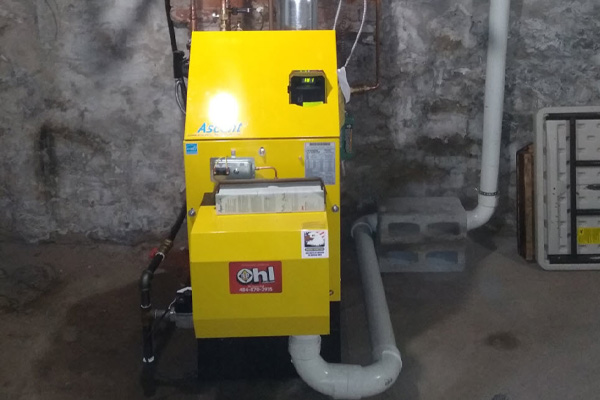
An oil heating system provides safe and clean heat for a home. Also, the lifespan of these systems runs almost twice as long as other systems. Consider an oil heating system as an investment for your property because of its efficiency, cost-effectiveness, and excellent AFUE ratings. Continue reading because, in this article, R.F. Ohl, a local heating oil delivery company, answers the question, “How does an oil heating system work?”.
First, we begin by dispelling some false statements about oil heating systems.
Myths About Oil Heating Systems
Explore some heating oil facts below:
- The Environment: While some individuals have a misconception that heating oil burns less cleanly when compared to other types of heating systems, we confirm this is untrue. Fuel oil, such as ULSHO, burns cleanly, and comes well within the air pollution standards set forth by the EPA, which we attribute to technological advancements in the equipment; this makes oil heating systems the best option to safeguard the environment.
- Cost: An oil system is the least expensive option and has the durability to run at its optimum for just about twice as long as other systems. Therefore, procuring one of these systems will make an excellent investment. Reduce your fuel costs by 5% by choosing an oil heater.
- Lifespan: Natural gas and propane heating systems can run for 11 to 14 years, while heating oil systems last almost thirty years more than gas and propane heaters.
- Safety: Many people think that heating oil is not a safe alternative, but this is incorrect. #2 heating oil is much like diesel fuel in that it is safe in its natural condition. If you store heating oil according to the specifications, there is no need to be concerned. Heating oil will not cause an explosion.
Related Article: Tips For Choosing A Fuel Oil Company
How Does An Oil Heating System Work?

Heating oil systems provide heat to a home in three ways: through radiators, vents, and baseboards. Once the temperature on the thermostat falls below a specified reading, it sends a signal to the heater to heat your home.
As the oil becomes warmer, it flows through the heating oil tank to a burner and then through a pump. Then the oil transforms into a warm mist mixed with air. This air and fuel mix moves into the burner and ignites in the combustion chamber.
The oil warms the water or air that heats the house, but this depends on the heating system installed. Air systems, also called central forced-air systems, utilize ducts and vents to push the heated air around the home. Alternatively, hydronic heating systems or water systems heat water that flows to the baseboards or radiators, but this depends on your configuration.
You can choose from two heating oil systems: a boiler or a furnace. They both have differences, but one similarity is that the newer system types run more efficiently. As stated above, HVAC technology has improved the manufacture of energy-efficient heat systems.
Oil-Heat Furnaces
The dated atmospheric furnaces are not as efficient as the newer models. In newer systems, fans move the exhaust air via a heat changer.
Using oil to heat your home’s furnace is a great option. The best models have condensing furnaces because they release less heat outside. The system cools the gases first instead of venting the heated exhaust immediately. Therefore, water vapors condense so that the exhaust flows out via a plastic pipe on its side.
Related Article: What Is That Whistling Sound During An Oil Delivery?
Oil-Fired Boilers

Hydronic boilers heat water that travels throughout the house to heat the space via the baseboards and radiators. The cooled liquids flow back to the boiler for reheating.
A steam boiler is another alternative heating oil system. Steam boilers are not as common as other models. However, they boil water, and steam flows through the system and pushes heat through the radiators.
Boilers and furnaces have differences, but the main one is that boilers function with water, and furnaces utilize air. These systems create heat similar to heated oil systems in that cold water or cold air runs through a cycle to reheat.
Boilers and furnaces use oil, and the process begins in the combustion chamber, where the oil transforms into flames. The heat exchanger heats the water or gases which flow within the system.
Maintenance of an Oil Heating System
Your oil heating system, like other heaters, will need to be maintained so that it functions efficiently and safely. Your first step would be to clean the thermostat before the winter to ensure that it will produce a comfortable temperature in the house.
If you take care of the stack parts and blower in the oil heating system and monitor the burner, you reduce unwanted particles in the system. Any debris restricts how the heater operates and affects how comfortable your house will be.
While you can complete a few maintenance tasks, you should connect with a professional who can ensure that your system is fully functioning before the cold season starts. If you have not called a technician yet, do not hesitate to make an appointment today. Annual maintenance is sufficient to enhance the system’s performance, improve comfort and air quality, and decrease your utility bills.
Related Article: Top 5 Tips For Buying Home Heating Oil
Environmental Benefits of Using Oil Heating Systems
An oil heating system creates clean heat, and the newer models create and transmit almost zero-level smoke and combustion particles into the air. The Environmental Protection Agency has shared that oil burners provide one of the cleanest combustion sources.
The storage of an oil tank does not threaten the environment or your health. Properly maintained tanks can last for several decades. Heating oil is safe because it is biodegradable and does not contain carcinogens.
Therefore, the environmental benefits are an excellent reason to purchase an oil heating system. It is cost-effective and durable and helps the environment by releasing little or no debris or smoke into the air.
Conclusion
If you plan to purchase a new heating system, you now know the advantages and how the oil heating system operates. New models are safer for the environment and reduce heating costs over time.
You must have your heating system evaluated by a certified technician to ensure it functions properly before the cold season. Professional HVAC contractors assist with making you comfortable in knowing that your system functions efficiently, safely, and without breakdown when you need it most during the winter. Ensure that you schedule your system for cleaning today!
Call R.F. Ohl For Fast & Affordable Heating Oil Deliveries

R.F. Ohl is a reliable HVAC company and heating oil supplier. We offer the most competitive heating oil prices in the region, and our deliveries are always completed in a timely and efficient manner. We offer many different delivery plans and financing options so that you can customize your heating oil deliveries to fit your needs. In addition, we employ only experienced, licensed HVAC technicians to complete any necessary heating tune-ups and repairs so that you can reduce your overall energy costs.
At R.F. Ohl, we provide state-of-the-art HVAC repairs, replacements, tune-ups, and installations. Our professionals have the knowledge and experience to offer you practical and reasonably priced solutions for all your home comfort needs.
Contact R.F. Ohl as soon as possible, and we will be happy to schedule a complimentary, in-home estimate of your HVAC system. Likewise, call us today to find out more about our fuel deliveries. Click the link to view our service area.
Click here to contact us today or give us a call at (610) 377-1098 if you have any questions.
The post How Does An Oil Heating System Work? appeared first on R.F. Ohl.
No comments:
Post a Comment